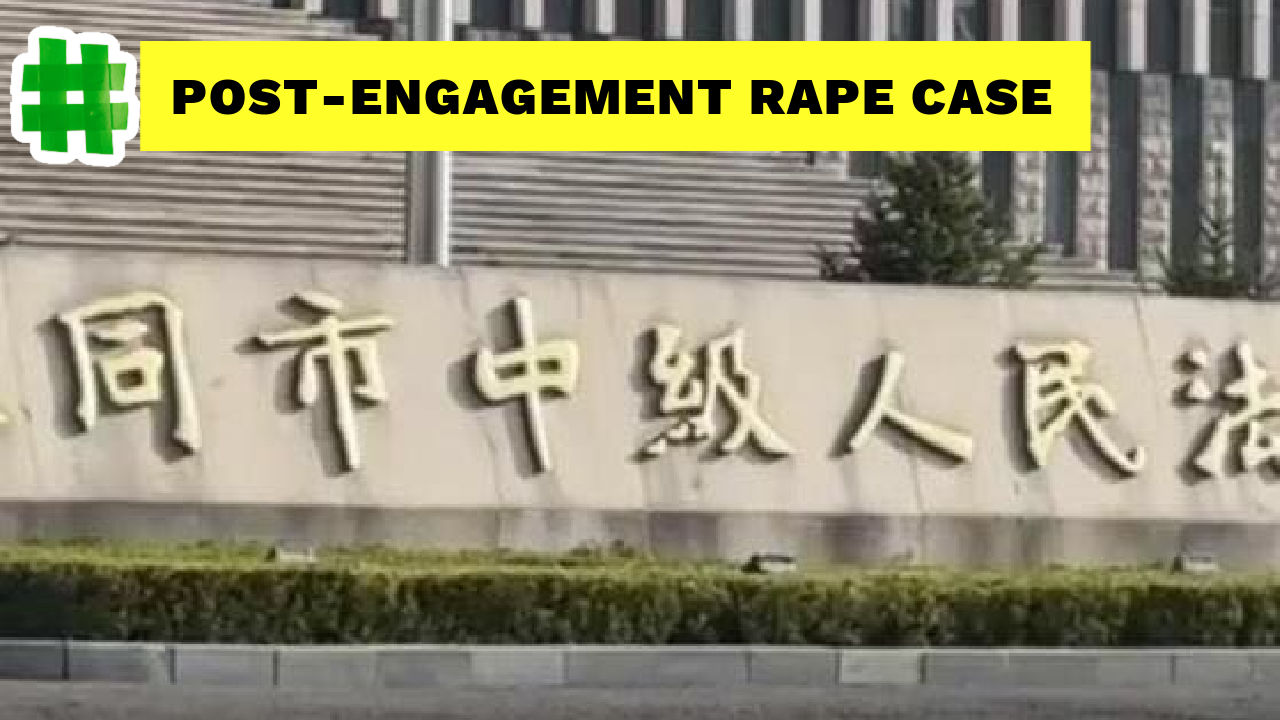Featured
China Trending Week 15/16: Gu Ming Viral Collab, Maozi & Meigui Fallout, Datong Post-Engagement Rape Case
Published
5 months agoon

Here’s a roundup of curated top trends and noteworthy discussions on Chinese social media this week.
For insights into the escalating US-China trade war, check our week 15 article here.

Chinese Tea Brand Gu Ming Goes Viral for Collab with Honkai: Star Rail Game
Since 2023, the power of creative collabs has become crystal clear: younger Chinese consumers especially love it when tea or coffee chains team up with unexpected partners, like Luckin and Maotai, or the controversial LeLeCha and Lu Xun and HeyTea with the Jingdezhen Ceramics Museum.
In the latest successful collabs, you see more ACG (Animation, Comics, and Games) mixing it up with China’s homegrown coffee and tea franchises, like the collab between HeyTea and Hello Kitty, which became a big hit in late 2024.
On April 18, Chinese tea brand Gu Ming (古茗, also known as ‘Good Me’) launched its new collaboration campaign with the Chinese anime-style game Honkai: Star Rail (崩坏:星穹铁道), featuring a range of collectible tea cups, bags, and other accessories.
The collab immediately shot to the top of Weibo’s trending list, and online queues went wild — with over 1.2 million people reportedly waiting in virtual lines to place an order. Some video showed employees getting overwhelmed with all the orders coming in. The surge led to widespread frustration over app crashes and users being logged out mid-process. By Friday, everything had sold out, and fans were already preparing for the next round of lining up.

🏛️ Verdict in Second Trial of Much-Discussed Post-Engagement Rape Case
An older story has gone viral again this week, following the verdict in a second high-profile trial in the so-called “Engagement Rape Case” (订婚强奸案). In May 2023, a young couple from Datong, Shanxi, held their engagement ceremony—they had met two months earlier through a matchmaking service. Along with an expensive engagement ring, the man’s family also paid a bride price of 100,000 yuan ($13,600). However, after the engagement party, the groom-to-be forced himself on the bride-to-be at his apartment, despite her resistance. She panicked, set fire to his curtains, attempted to flee, and eventually called the police.
In December 2023, the man was convicted of rape and sentenced to three years in prison. He appealed the ruling, but in the second trial verdict announced this week, the Datong court rejected Xi’s appeal, upheld the original conviction, and confirmed the sentence. The man continues to deny any wrongdoing.
This case has become significant because it touches on so many layers: sexual consent, bride price customs, traditional gender norms, sexual violence, and online doxxing. Among the more debated details is the misunderstanding surrounding the victim’s medical report, which showed her hymen was intact—leading some to mistakenly believe this meant rape was impossible. In reality, as confirmed by medical research, hymen status is not an accurate or reliable indicator of prior sexual activity or assault (source). Another controversial element is the role of the perpetrator’s mother, who exposed the victim’s private information online, further inflaming public debate.
Discussions around the case remain heated. While some netizens express concern that the verdict may contribute to growing distrust between men and women—arguing that men may now feel vulnerable if they cannot prove sexual consent with their own fiance or wife (and even suggesting they should make up sexual consent contracts now) —many others voice strong support for the victim, believing that the man should have received an even heavier sentence.

💔 Domestic Violence Allegations: Russian-Chinese Couple’s Relationship Into the Spotlight
The relationship between the influencer couple of the Russian ‘Maozi’ (毛子) and Chinese ‘Meigui’ (玫瑰) has become a trending topic of debate these days due to rumors of domestic violence. The couple have been running a popular daily life family vlogging account (毛子一家生活点滴). On Douyin, they have over two million fans, on Weibo, more than 2.7 million. Central to their vlogs is their young son Chuanchuan. On April 15, Meigui virtually dropped a bombshell by exposing how she’s a victim of domestic abuse, writing:
“You were really good to me. So good, that I became your possession. The psychological manipulation was endless. I couldn’t have friends, needed your permission to go anywhere, and if I disobeyed, you’d hit me (it only started this year and grew more intense). I used to romanticize pain, thinking it was your way of showing me love. I’d laugh at your jokes and never held grudges. But when my life was threatened, I couldn’t just sit back and ignore it anymore.”
Now that Meigui has come forward on Weibo to share screenshots and videos suggesting she is being abused and scolded by her husband, even in the presence of their son, netizens are worried about her but also about the young boy and how his parents’ abusive relationship is affecting him, leading to the hashtag “Poor Chuanchuan” (#心疼川川#) momentarily becoming top trending on April 15. Meanwhile, ‘Maozi’ also created an account on Weibo, where he denied ever hitting his wife. “Zero tolerance for domestic abuse,” one commenter wrote. “I support Meigui and hope she gets a divorce soon.”
By Manya Koetse
(follow on X, LinkedIn, or Instagram)
Spotted a mistake or want to add something? Please let us know in comments below or email us. First-time commenters, please be patient – we will have to manually approve your comment before it appears.
©2025 Whatsonweibo. All rights reserved. Do not reproduce our content without permission – you can contact us at info@whatsonweibo.com.
Manya is the founder and editor-in-chief of What's on Weibo, offering independent analysis of social trends, online media, and digital culture in China for over a decade. Subscribe to gain access to content, including the Weibo Watch newsletter, which provides deeper insights into the China trends that matter. More about Manya at manyakoetse.com or follow on X.

China Military
China’s “Post Parade Afterglow”: 6 Social Media Trends
Published
15 hours agoon
September 14, 2025
🔥 Quick Take: Trending in China
This is a brief update from our curated roundup of what’s trending in China this week. A version of this story also appears in the Weibo Watch newsletter. Subscribe to stay in the loop.
In the last newsletter, I promised to follow up with more ‘post-parade’ responses. On Weibo and other social media platforms in China, hundreds of hashtags have emerged around the theme of the “afterglow after the parade” (阅兵后劲). In addition to the featured ‘AFP versus Xinhua’ discussion, here are some other noteworthy social media trends following the September 3 event, which turned out to be one of China’s largest military parades:
1 🇨🇳 “I’m So Happy in China”: Putin and Kim Jong-un’s Daughter in the Picture
Besides everything happening on Tiananmen Square during the parade, many netizens were just as interested—if not more—in what was going on at the sidelines. The presence of Putin and Kim Jong-un drew a lot of attention, and since political discussions are highly controlled on Chinese social media—especially during such high-profile events—online conversations mostly focused on smaller, more personal details.
One viral clip posted by Ta Kung Wen Wei Media (大公文匯網, a pro-Beijing Hong Kong media outlet) showed Putin during his various visits to China, where he always seems to enjoy local delicacies. The video’s caption read: “You have no idea how happy I am in China!” (“我在中国的快乐谁懂啊?!”).
As for Kim Jong-un, his daughter Kim Ju Ae, who accompanied him on this trip to China, became the social media star of the day. Many netizens still remembered her from a few years ago, when she joined her father at a Pyongyang military banquet and a widely publicized military parade. At the time, she was believed to be around ten years old, and Chinese bloggers nicknamed the round-cheeked girl “Golden Chubby” (金胖子) and “Golden Fourth Fatty” (金四胖).

In 2023 versus 2025
Now, however, the little girl has grown into a young lady. Many praised her style and grace, calling her a “little princess” (小公主). The hashtag “Kim Jong-un brought his daughter” (#金正恩把女儿金主爱带来了#) garnered over 190 million views on Weibo.
2 🎥 An Unexpected Face at Military Parade: US Pawnshop Owner Evan Kail
The American Evan Kail, a former pawnshop owner from Minnesota, was among the more unexpected faces at the parade. He appeared to be a semi-official guest, not watching the parade from Tiananmen Square but instead joining hundreds of locals to view it via livestream at the Temple of Heaven, where he was surrounded by cameras and media—making his attendance part of the broader media circus surrounding the military parade (#埃文凯尔天坛观看阅兵直播#).

Kail first went trending in 2022, when he posted a video asking for help after coming across an old war photo album he believed contained rare and previously unseen images of the Nanjing Massacre. He eventually donated the album to China. Although the book reportedly turned out not to contain photos of Nanjing but rather of Shanghai (with some images likely being mass-produced souvenir photos—and the authenticity of the album not really being the focus here), Kail is still well respected in China for bringing international attention to the atrocities of Nanjing. He recently published a book in China, and his story has been widely promoted by Chinese state media outlets.
3🏅 Parade Soldiers’ Sunburn Tan Lines Praised as “Special Medals”
Some of the post-parade “afterglow” discussions on social media focused on videos showing soldiers returning from the September 3 parade. They were easily recognizable at train stations and airports by the stark sun lines on their faces—caused by long hours of outdoor training and marching while wearing helmets with chin straps (see videos).

The “special medal” sun lines
Netizens called the marks a “special medal” (特殊的勋章), and the clips of soldiers returning home with their sunburnt faces also added a more vulnerable and human touch to those perfect military formations.
4 🤐 Man Detained Over “Parade-Insulting Comments”
It wasn’t all roses online during the military parade—although most netizens probably wouldn’t have noticed due to strict censorship. Some people were punished for expressing online criticism. One 47-year-old man surnamed Meng (孟) from Hubei was turned into a warning for others and was detained after posting “insulting” comments about the September 3 military parade on a livestream on WeChat. Another man from Tianjin saw his Weibo page blocked after he suggested that watching the parade is a shallow or fake form of patriotism—and it’s highly likely he was not the only one.
5 🚀 Military Model Toys Boom 175% in Sales Following Parade
Another post-parade effect: China has seen a surge in consumer interest in military-themed toys, from fighter jets to missiles and tanks. Starting on September 3, the military model category on Chinese e-commerce platform JD.com reported a 175% increase in sales.

6 🪖 The Next Military Parade
Thought this was it? Not quite. Chinese media are already stirring anticipation for future military parades with the hashtag “Looking Forward to the Next Military Parade” (#期待下次阅兵了#). While nothing has been confirmed, the next likely milestone years for large-scale parades are 2027 (the People’s Liberation Army’s 100th anniversary) and 2029 (the 80th anniversary of the founding of the People’s Republic of China). To be continued…
By Manya Koetse
(follow on X, LinkedIn, or Instagram)
Spotted a mistake or want to add something? Please let us know in comments below or email us. First-time commenters, please be patient – we will have to manually approve your comment before it appears.
©2025 Whatsonweibo. All rights reserved. Do not reproduce our content without permission – you can contact us at info@whatsonweibo.com.
China World
From Schadenfreude to Sympathy: Chinese Online Reactions to Charlie Kirk Shooting
From mockery of his pro-gun stance to posts over America’s deepening divisions, Chinese social media responds to the Charlie Kirk shooting.
Published
3 days agoon
September 12, 2025
The assassination of prominent American activist and Trump ally Charlie Kirk, 31, became a trending topic on social media all over the world, including on Chinese social media platforms Weibo, Douyin, Toutiao, and Zhihu.
Kirk was shot on September 10 while speaking at an event at Utah Valley University in Orem, Utah. At the time of writing, a suspect was apprehended after a manhunt of two days (#特朗普称柯克枪击嫌疑人已被拘留#).
Using hashtags such as “Trump’s Political Ally Shot While Speaking” (#特朗普政治盟友演讲时遭枪击#), Chinese media outlets, online commentators, and regular netizens have been discussing Kirk’s death, with a focus on Kirk’s ideologies and the deeper issues in the United States that may have contributed to him being shot.
Although Charlie Kirk (查理·柯克) is not widely known among the mainstream Chinese audience, avid social media users are familiar with him. His past videos, with added Chinese subtitles, are popular on platforms like Bilibili, and his persona and viewpoints have sparked debate on sites like Zhihu.
Charlie Kirk is a highly visible figure on global social media for engaging in face-to-face debates with left-leaning students (or anyone who disagrees with him) on university campuses in the United States and even in the United Kingdom. These debates often became heated, as they touched on some of the most polarizing political issues.
Kirk defended his anti-abortion, pro-gun, pro-Trump, and anti-immigration stances and criticized transgender identities and same-sex marriage.
There are various discussions on Chinese social media related to his death.
1. No Sympathy: Linking Kirk’s Death to His Pro-Gun Advocacy
A central part of the discussions surrounding Kirk’s death on Chinese social media focuses on American gun laws and Kirk’s own views on gun control.
On Zhihu and Weibo, many commenters echoed a sentiment also seen on Western social media, noting the irony of Kirk being killed while advocating for gun rights. In 2018, Kirk tweeted about a mass shooter being shot, writing: “guns save lives” (#查理柯克宣扬枪支拯救生命#).
Kirk was discussing and defending his pro-gun stance in Utah at the moment he was shot.
With this in mind, as well as taking Kirk’s other conservative viewpoints into account, many Chinese netizens do not necessarily empathize, with some even creating light banter around his death.
One popular comment on Weibo said:
Others claimed that Kirk “got what he wanted”:
This sentiment was quite prevalent on Chinese social media, where others also stressed that the very gun freedoms Kirk advocated for ultimately killed him, calling it the “gunshot of freedom” (“自由的枪声”).
Another commenter (元锡损) on Zhihu even described the killing of Kirk as a form of “art,” presuming that he was shot by someone who opposed gun ownership:
But some argue it all goes beyond a pro-gun stance, like the international news commentator Zhu Xi Er Ming (@逐汐而鸣), who also showed little empathy for Kirk:
These kinds of reactions often appear on Chinese social media whenever political unrest or major incidents occur in the United States, with netizens expressing anti-American sentiments and criticizing America’s “so-called freedom” — especially since human rights are a sensitive topic in China–US relations.
Criticism of America’s gun laws is often part of such criticism, such as after the Orlando shooting or other major shootings. This, in part, has to do with how US and China are practically polar opposites on the issue of gun control and what it means for ‘freedom.’
As one Xiaohongshu blogger (@民间观察员张向强) wrote, before news of the suspect’s apprehension came out:
China has some of the world’s strictest gun control laws and the ban on civilian gun ownership – as well as extensive surveillance systems for public safety – is generally supported by the public.
2. Calls for Compassion and Condemnation of Violence
But reactions are mixed; not everyone is unsympathetic toward Kirk, nor do all commenters link his pro-gun stance to his death. Many voices also pushed back against claims that Kirk “got what he deserved.”
Yan Feng (严锋), a prominent commentator and Professor of Chinese Literature at Fudan University, called for a more compassionate response. He wrote:
In other comments, he said he opposed private gun ownership, but also suggested he did not believe Kirk was shot due to his pro-gun stance, while also stressing that Kirk never supported the use of guns to kill people with opposing views.
Luo Yiming (@罗祎明医生), a medical doctor at Mount Sinai St. Luke’s, wrote:
There were also posts highlighting how Dean Withers, a left-wing influencer and long-time opponent of Charlie Kirk, reacted to the news of his death during a livestream — with shock and tears. That reaction also sparked discussions about how, even if you hold opposing views, you can still feel sorrow over someone being killed.
3. “More Charlies Will Stand Up”: American Dysfunction ad Division
Although the initial discussions over Kirk’s death on Chinese social media seem to remain a bit on the surface, focusing on gun control and going from questions of karma to compassion, there are also other discussions placing his assassination more into a context of American social and political polarization.
One of China’s most famous online political commentators, Hu Xijin (@胡锡进), argued that political assassination is an inherent, dark part of American modern history. He wrote a lengthy column on Kirk’s death, calling it “a crash of the software of American democracy” (“这是美国民主软件的一次死机”) and also saying:
Well-known Chinese internet commentator Wanghu de Jianqiao (@王虎的舰桥) blamed American social governance for Kirk’s killing. He wrote:
Others agree with the notion that something is inherently amiss in American society, with some suggesting that the shooting shows the “unusually intense class struggle in the United States” (“凸显了美国阶级斗争的异常尖锐”).
Zhihu user Wenhou (文猴), who also runs a WeChat account focused on men’s self-improvement, blamed Kirk’s death on leftist policies and suggested that American feminism was complicit in the country’s “social decay.”
Hu Xijin, as well as other commenters, think that the Charlie Kirk shooting might be a turning point for what is yet to come. On Zhihu, some predict an ideological hardening that could push America closer to more political violence and societal fragmentation. Others think that it will weaken the radical left and unite the modern right-wing factions.
Some commentators are especially pessimistic about America’s future. One example is the active Weibo commentator, entrepreneur and public persona Xiang Ligang (@飞象网项立刚), who tied Kirk’s assassination to the recent shocking murder of Ukrainian refugee Iryna Zarutska while driving a train home in Charlotte, North Carolina.
Xiang wrote:
Zhihu blogger ‘Patrick’ wrote:
One anonymous Weibo commenter wrote:
By Manya Koetse
(follow on X, LinkedIn, or Instagram)
Spotted a mistake or want to add something? Please let us know in comments below or email us. First-time commenters, please be patient – we will have to manually approve your comment before it appears.
©2025 Whatsonweibo. All rights reserved. Do not reproduce our content without permission – you can contact us at info@whatsonweibo.com.
Subscribe
What’s on Weibo is a reader-supported publication, run by Manya Koetse (@manyapan), offering independent analysis of social trends in China for over a decade. To receive new posts and support our work, consider becoming a paid subscriber.

Get in touch
Would you like to become a contributor, or do you have any tips or suggestions? Get in touch here!

China’s “Post Parade Afterglow”: 6 Social Media Trends

From Schadenfreude to Sympathy: Chinese Online Reactions to Charlie Kirk Shooting

China’s “AFP Filter” Meme: How Netizens Turned a Western Media Lens into Online Patriotism

The Final Countdown: China’s Military Parade on Social Media

How Female Comedians Are Shaping China’s Stand-Up Boom

Hidden Cameras and Taboo Topics: The Many Layers of the “Nanjing Sister Hong” Scandal

“Jiangyou Bullying Incident”: From Online Outrage to Offline Protest

The Next Labubu: What the Rise of Wakuku Tells Us About China’s Collectible Toy Wave

A Very Short Guide to China’s Most Popular Designer Toys

Yearnings, Dreamcore, and the Rise of AI Nostalgia in China
Popular Reads
-

 China Memes & Viral2 months ago
China Memes & Viral2 months agoHidden Cameras and Taboo Topics: The Many Layers of the “Nanjing Sister Hong” Scandal
-

 China Books & Literature11 months ago
China Books & Literature11 months agoThe Price of Writing Smut: Inside China’s Crackdown on Erotic Fiction
-

 China Society12 months ago
China Society12 months agoDeath of Chinese Female Motorcycle Influencer ‘Shigao ProMax’ Sparks Debate on Risky Rides for Online Attention
-

 China Insight4 months ago
China Insight4 months agoUnderstanding the Dr. Xiao Medical Scandal



